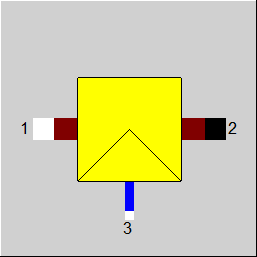

|
Line connections |
|
|
|
1 |
Inlet |
|
|
2 |
Outlet |
|
|
3 |
Water injection |
|
General User Input Values Physics Used Displays Example
Component 53 checks, whether there is saturation of steam in a classical type of pipe (air, flue gas, fuel gas, coal, oil, user-defined or crude gas stream) as a function of the partial pressures. Via connection line 3, H2O is supplied in such quantities that saturation is reached. No specifications are necessary.
Table Differences for Injections
In the case of the component “Water injection“ (38) as well as both saturizer components (53, 97) it is necessary to transfer the injected water that is calculated in the injection line according to the water/steam table (usually IAPWS-IF97) into the flue gas/ air etc., where the calculation is carried out with pressure-independent FDBR polynomials. There are different options regarding the point where this table transfer is carried out; these lead to slightly different results in each case. These differences are due to the fact that the treatment of the steam as ideal gas represents an approximation that becomes inaccurate at high pressures and lower temperatures in particular. In concrete terms this means that the modeling of the injection will become the more realistic the later the table transfer takes place.
It is also possible to carry out this table transfer another step later than .
This can now be set using the flag FTABC (detailed description see Release -Notes 12. Chapter 1.3.5.).
Here the previous results can be reproduced with FTABC=0.
with
FTABC=1 It is now possible to carry out this table transfer another step later
Default: X1i=M1i/M1, X1H2O=M1H2O/M1 (water fraction of M1 in M1)
X2i=M2i/M2, etc.
Mol: molar masses
i stands for the constituents
The first step of the calculation checks, whether there is liquid water or just dried saturated gas in the gas mass flow of line 1. If neither water nor gas is in the line, the correct amount of water is supplied to reach saturation under adiabatic conditions. By means of temperatures T1, T2 and T3 as well as pressures P2=P1 and P3, the following equations are calculated by the iteration method:
{ M2 = M1+ DMH2O
M2 * (1-X2H2O) = M1 * (1-X1H2O) }
DMH2O/M1=(X2H2O-X1H2O)/(1-X2H2O)
H2=(H1*M1 + DMH2O*(H3-RH2O) / (M1+DMH2O) , RH2O: latent heat
X2H2OL=0
X2H2O=X2H2OG (water only as steam at the outlet)
X2H2OG= P'(T2)*Mol[steam] / (P2*Mol2[total])
T2 = f (P2,H2)
P' means the saturation pressure of water for the temperature T2 to be determined. X1H2OG or X2H2OG are the weighting fractions of steam in the gas mass flows 1 or 2.
Component 3 (mixer with throttle):
There is only little similarity. Fluids are brought together, whereby the auxiliary flow 3 is throttled to the pressure of the main flow.
Component 37 (mixer) :
There is only little similarity. Fluids are brought together, whereby the auxiliary flow 3 is throttled to the pressure of the main flow.
Component 38 (water injection):
There is a certain similarity. A quantity of water is injected until the outlet reaches a specific temperature. A regulator sets the correct injection quantity.
Component 97 (Extended Saturizer):
In case of this component, the quantity of the injected water can be specified. There is an outlet for surplus water. The water can also come out as sub cooled.
|
FTABC |
Material table conversion point Like in Parent Profile (Sub Profile option only) Expression = 0: For all the water at outlet temperature and total pressure (old mode) = 1: For gaseous fraction of water after expansion to partial pressure |
|
All Cases |
||
|
|
X1i=M1i/M1, X1H2O=M1H2O/M1 (water in M1 by M1) X2i=M2i/M2, and so on Mol: molar masses RH2O: latent heat P2 = P1
Iteration start {
{ M2 = M1+ DMH2O M2 * (1-X2H2O) = M1 * (1-X1H2O) }
DMH2O/M1=(X2H2O-X1H2O)/(1-X2H2O) H2=(H1*M1 + DMH2O*(H3-RH2O) / (M1+DMH2O) if i=H2O, then { X2H2O=(X1H2OL+X1H2OG+DMH2O/M1)*M1/(M1+DMH2O) } else { X2i=(X1i)*M1/(M1+DMH2O) } T2 = f (P2,H2)
X2H2OG= P'(T2)*Mol[steam] / (P2*Mol2[total])
regula- falsi – method { ZW = YYold-YY Value = (XXold-XX)/ZW YY = X2H2OG-X2H2O XX = X2H2O X2H2O = XX-YY*value }
if ABS(X2H2O-X2H2OG)<1E-7, then end iteration }
X2H2OL=0 X2H2O=X2H2OG (water only as steam at the outlet)
M3 = DMH2O M2 = M1+M3 |
|
 |
Display Option 1 |
Click here >> Component 53 Demo << to load an example.